Unit 1 Past and Present Grammar 课件(共38张PPT)
文档属性
| 名称 | Unit 1 Past and Present Grammar 课件(共38张PPT) | 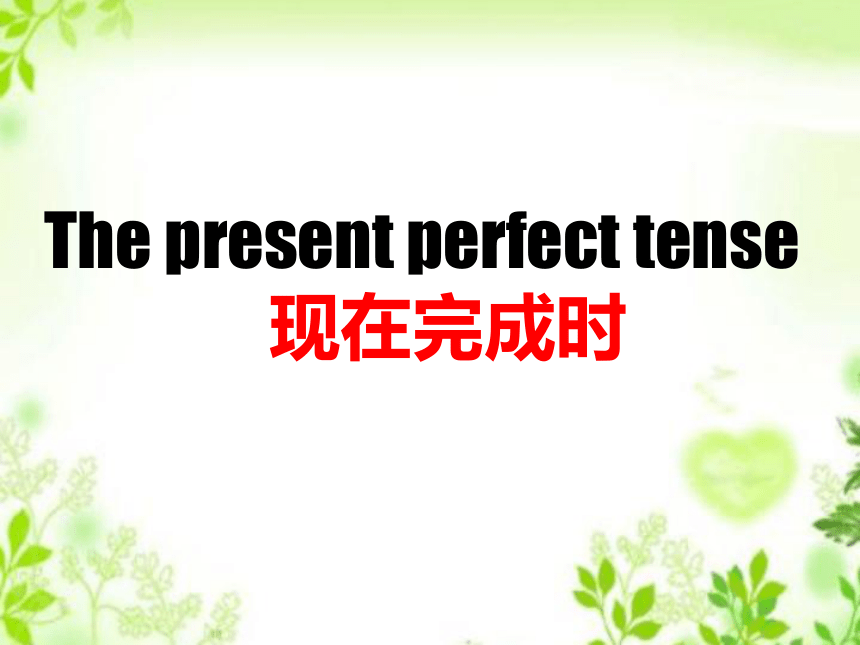 | |
| 格式 | zip | ||
| 文件大小 | 343.1KB | ||
| 资源类型 | 教案 | ||
| 版本资源 | 牛津译林版 | ||
| 科目 | 英语 | ||
| 更新时间 | 2022-02-07 16:17:54 | ||
图片预览

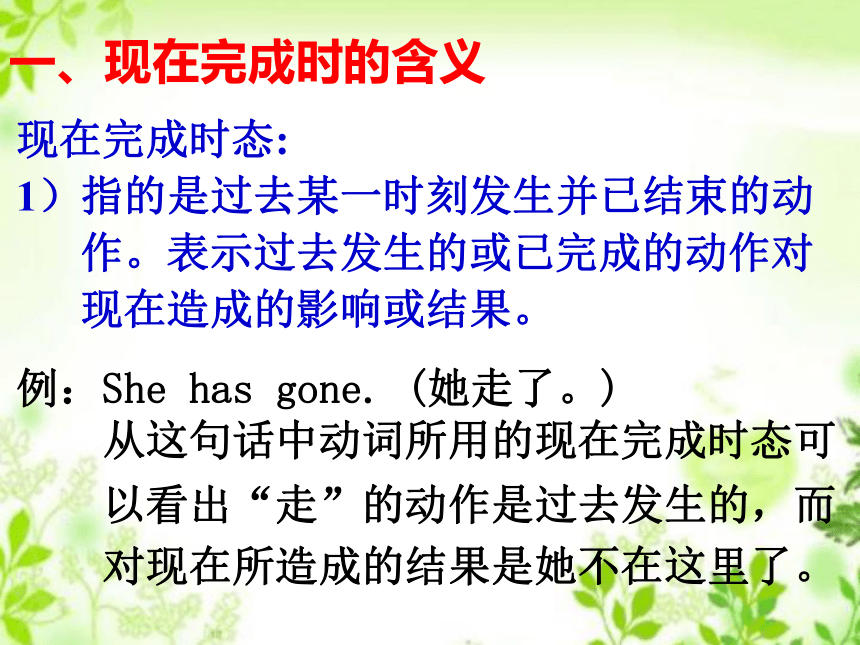

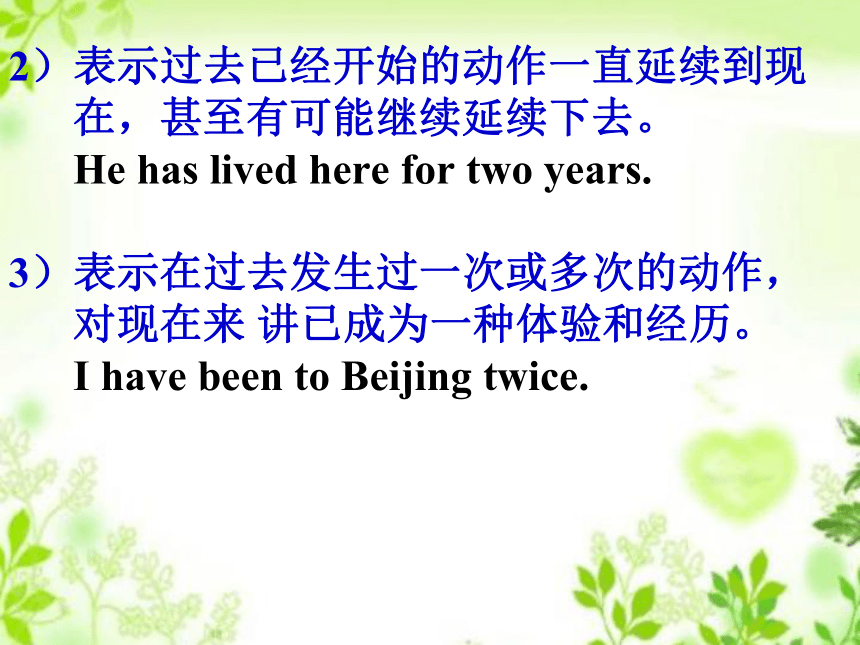
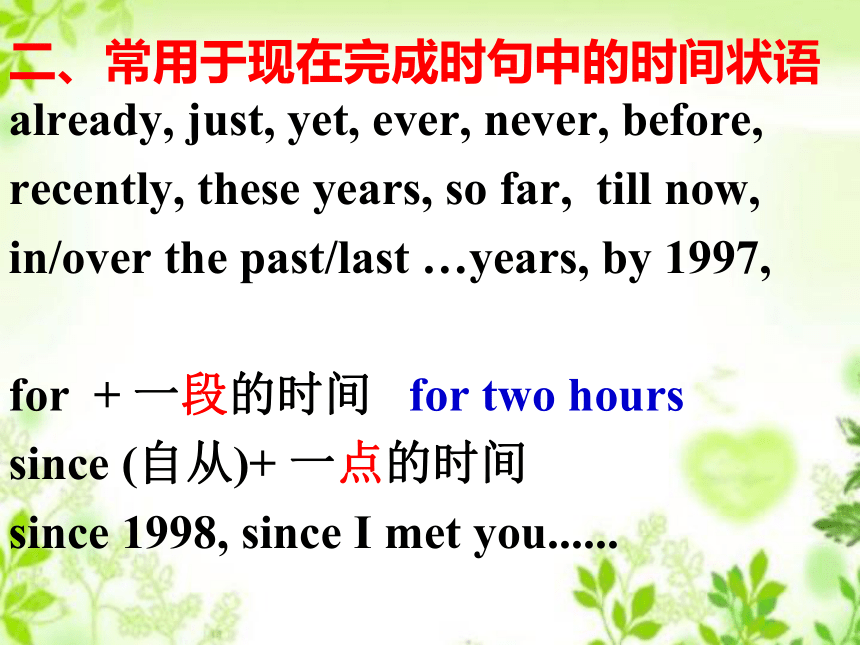

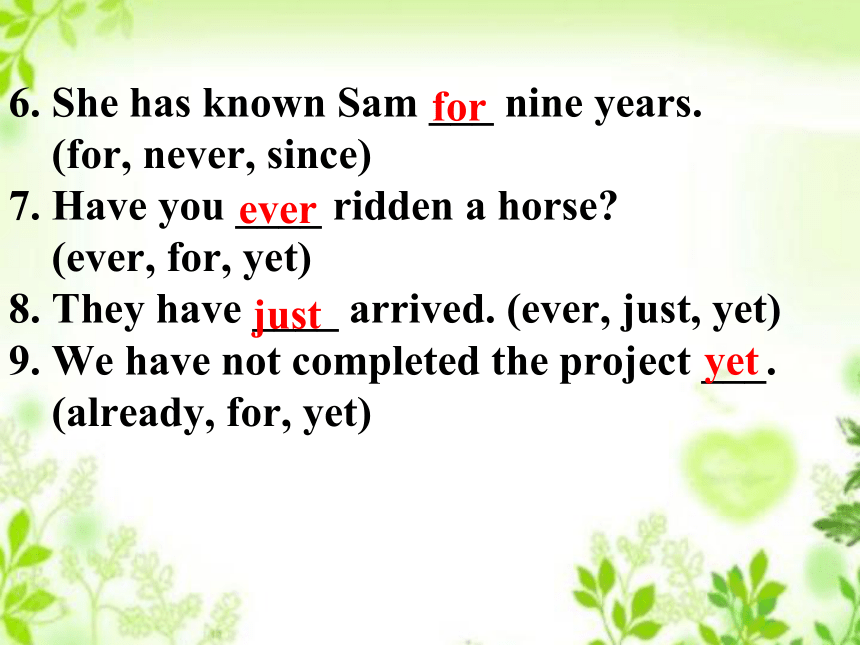
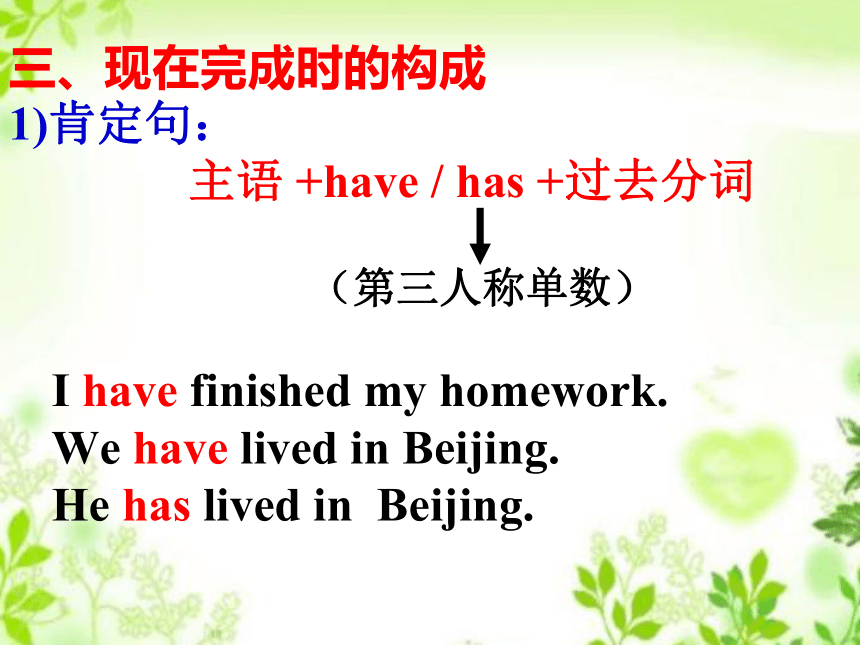
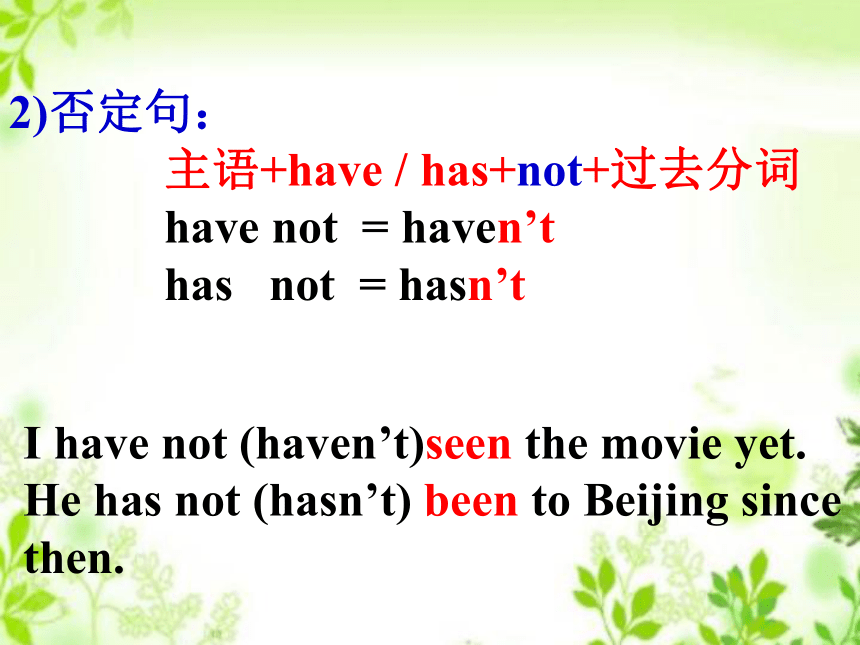

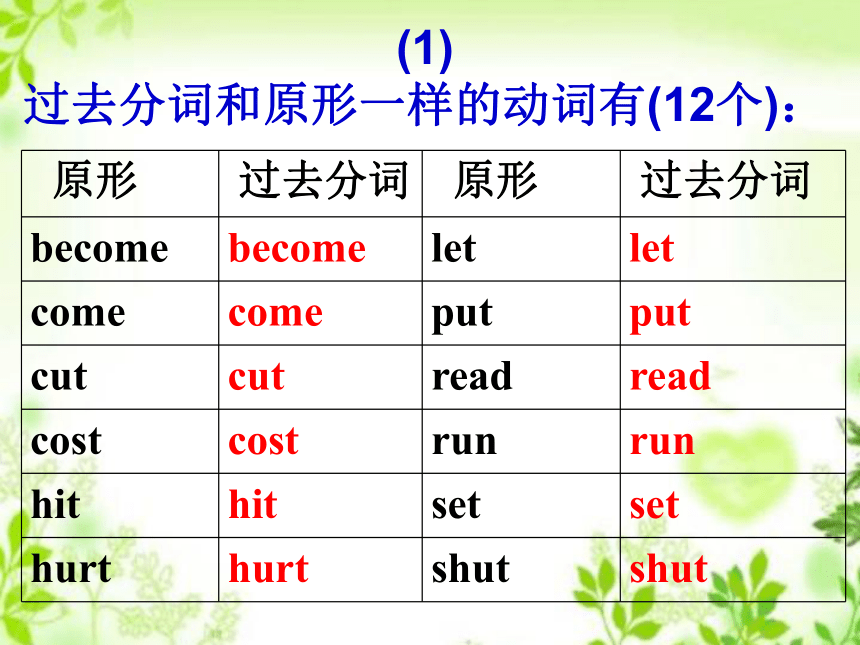
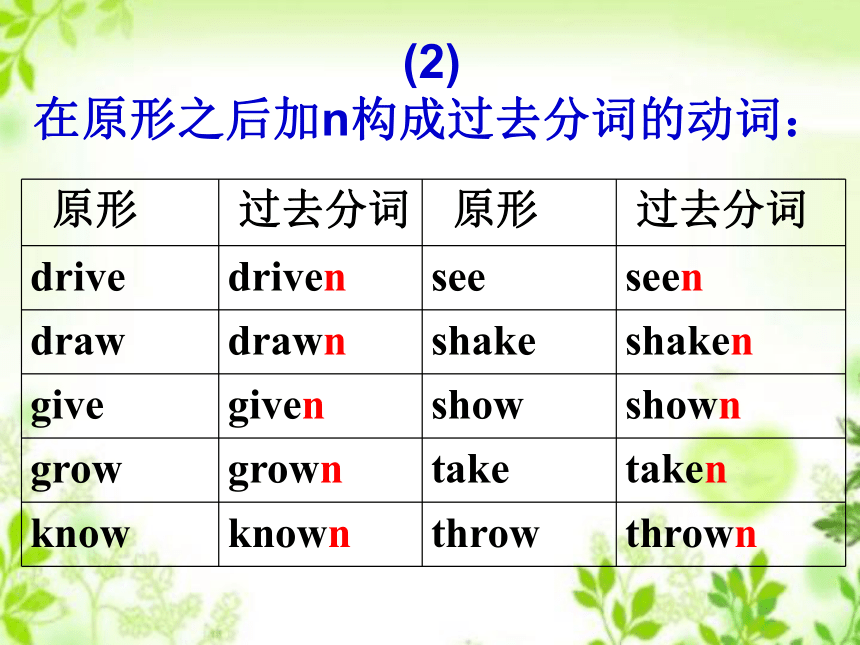
文档简介
(共38张PPT)
The present perfect tense
现在完成时
现在完成时态:
1)指的是过去某一时刻发生并已结束的动
作。表示过去发生的或已完成的动作对
现在造成的影响或结果。
例:She has gone. (她走了。)
从这句话中动词所用的现在完成时态可
以看出“走”的动作是过去发生的,而
对现在所造成的结果是她不在这里了。
一、现在完成时的含义
He speaks French so fluently. He learned it in Paris. He was there for two years.
He has studied French.
(他学过法语。)
这句话所说明的结果是他现在懂法语。
Look! The blackboard is so clean now.
He has cleaned the blackboard.
(他已经擦过黑板了。)
这句话所表示的结果是黑板现在是干净的。
2)表示过去已经开始的动作一直延续到现
在,甚至有可能继续延续下去。
He has lived here for two years.
3)表示在过去发生过一次或多次的动作,
对现在来 讲已成为一种体验和经历。
I have been to Beijing twice.
already, just, yet, ever, never, before,
recently, these years, so far, till now,
in/over the past/last …years, by 1997,
for + 一段的时间 for two hours
since (自从)+ 一点的时间
since 1998, since I met you......
二、常用于现在完成时句中的时间状语
1. Have you done your homework ______
(for, just, yet)
2. I have _______ been to Chengdu.
(ever, never, yet)
3. He has _______ washed the dishes.
(already, ever, for)
4. He has worked there _____ he left school.
(already, just, since)
5. Have you cleaned your room ___
(for, just, yet)
yet
never
already
since
yet
6. She has known Sam ___ nine years.
(for, never, since)
7. Have you ____ ridden a horse
(ever, for, yet)
8. They have ____ arrived. (ever, just, yet)
9. We have not completed the project ___.
(already, for, yet)
for
ever
just
yet
三、现在完成时的构成
1)肯定句:
主语 +have / has +过去分词
I have finished my homework.
We have lived in Beijing.
He has lived in Beijing.
(第三人称单数)
2)否定句:
主语+have / has+not+过去分词
have not = haven’t
has not = hasn’t
I have not (haven’t)seen the movie yet.
He has not (hasn’t) been to Beijing since then.
3)一般疑问句
Have/Has+主语+过去分词
Have you finished the work
Has she arrived here
4) 特殊疑问句
特殊疑问词+have/has+主语+过去分词
How many times have you been to the
Great Wall
原形 过去分词 原形 过去分词
become become let let
come come put put
cut cut read read
cost cost run run
hit hit set set
hurt hurt shut shut
(1)
过去分词和原形一样的动词有(12个):
原形 过去分词 原形 过去分词
drive driven see seen
draw drawn shake shaken
give given show shown
grow grown take taken
know known throw thrown
(2)
在原形之后加n构成过去分词的动词:
原形 过去分词 原形 过去分词
begin begun eat eaten
drink drunk fall fallen
ring rung hide hidden
sing sung ride ridden
swim swum write written
do done go gone
(3)
break broken be been
choose chosen wear worn
speak spoken fly flown
wake woken forget forgotten
1. I _________ (do) my homework already.
2. He ______________(not finished) his
homework yet.
3. _____ you ever ____ (be) to Haiwaii
4. We _____ never _____ (see) such an
exciting match before.
5. Mother ____ just _______(clean) the house.
Please don’t come in.
6. They ______________ (practice) this game
twice.
have done
has not finished
Have
been
have
seen
has
cleaned
have practiced
7. I ______________( not hear) from her yet.
8. _____ they _____(be) here recently
Yes, they have.
9. I __________(be) busy recently.
10. ---_____your father ever ________
(travel) to New York
---No, never.
11. He ________________(not travel) by
plane yet.
12. He __________(learn) English for three
years.
haven’t heard
Have been
have been
Has travelled
hasn’t travelled
has learned
13. We ___________ (learn) English for three
years.
14. Mr. Green ________ (be) in China these
years.
15. They ___________(write) 15 songs so far.
16. The population __________ (grow) more
slowly in the past ten years.
17. The Jiangs _________(live) here for
almost ten years.
18. He __________(work) in the factory since
1994.
have learned
has been
have written
has grown
have lived
has worked
19. His parents ___________(teach) in this
school since they came to the city.
20. The child ________(sleep) since two hours
ago.
21. He _________ (wait) for an hour.
22. I ______________ (not finish) the work
yet.
23. _____ you ______ (know) him since then
24. I __________ (hear) from my brother
recently.
have taught
has slept
has waited
haven’t finished
Have
known
have heard
25. We _________ (be) there many times in
the past 3 years.
26. How long ____ you______ (stay) at home
since the summer holiday began
27. He __________(not read) the book before.
28. Where is your sister
My sister ________ (go) to Changchun .
29. He ________ (live) in his hometown
since he left here.
30. The writer ___________ (finish)
several story-books since 1990.
have been
have
stayed
hasn’t read
has gone
has lived
has finished
31. He _________ (wait) for an hour.
32. I______________(not finish) the work yet.
33. _____ you ______ (know) him since then
34. I__________(hear)from my father recently.
35. We _________(be) there many times in the
past 3 years.
36. They ___________ (finish)the work so far.
37. How long _____you______(stay) at home already
38. I ___________(not read) the book before.
39. He____ just_____(do) it.
has waited
haven’t finished
known
have heard
have been
have finished
Have
have
stayed
haven’t read
has
done
40. We ________(have) an exam again
sometime next week.
41. By 2000, we___________(plant) 1000 trees.
42. I____________(mop) the floor already.
43. I_____________(not wash) the clothes yet.
44. Tom isn’t here. He ________(go)to the
bank.
45. The girl __________(not give) it to me yet.
46. Tom and Jill ____ just ______ ( buy) some
flowers.
47. They____ never_______(study) in the
school.
will have
had planted
have mopped
haven’t washed
has gone
hasn’t given
have
bought
have
studied
48. My mother ____ never _____(be) to
Shanghai before.
49. Mike_______(have) lunch already.
50. Jill ____(meet) me yesterday afternoon.
51. The first class _________already (begin).
52. We_____never_____(see) such an
interesting film.
53. ____your mother ________( write) to you
yet Yes, she_____.
54. Look, the snow ___________( stop).
Let’s ______( make) a snow man.
have
seen
has
been
has had
met
has begun
Has
written
has
has stopped
make
55. So far, no man ____________(travel)
farther than the moon.
56. I__________(hear) from my parents
recently.
57. Tom with his friends ________( be) to
Jiangyin many times.
58. My family ___________( travel) a few
cities in recent years.
59. Our city ___________ ( change) a lot
during the past few years.
60.The twins ________( see) the film twice .
has traveled
have heard
has been
have traveled
has changed
have seen
改错:
1.I have meet Mr Green yet.
2.Tom have just telled a story.
3.We have heared the talk already.
4.Have your father bought a new car
5.He has just drink some milk.
6.Have you lunch yet
7.Jill has went to Dalian three times.
8They have planted 20 trees just now.
9.When have you see the film Just now.
10.They haven’t been to Guangdong already.
11.The police has return already.
I bought a new bag last month.
(用already替换last month改写)
____________________________________
2. He has already had lunch at home.
(改为一般疑问句)
___________________________
3. These American friends have visited our school.(否)______________________________________________
I have bought a new a bag already.
Has he had lunch at home yet
These Americans friends haven’t visited our school.
4. The boy has stood outside for half an hour.
(提问)
5. John has been to the U.S.A a few times.
(提问)
6. You have done your work, _______you
(改为反意疑问句)
7. He has never been abroad, ______he
(改为反意疑问句)
8. We have got little milk, _______we
(改为反意疑问句)
How long has the boy stood outside
Where has John been a few times
haven’t
have
has
9. I have already worked out this math
problem (改为否定句)
I_______worked out the math problem ___.
10. He has already finished the book.
(改一般疑问句并做回答)
_____he________the book ____
Yes, he_____. / No, he______ .
11. I have got a book.
(改一般疑问句并做肯定和否定回答)
_____you ___ a book
Yes, I ____. / No, I_______.
haven’t
yet
Has
finished
yet
has
hasn’t
Have
got
have
haven’t
12. He has got a book.
(改一般疑问句并做肯定和否定回答)
____he ____a book
Yes, he____. / No, he______.
13. Millie has traveled to Beijing twice.
14. My daughter has flown her kite.
15. They have never visited Zhalong Naturre
Reserve.
How many times has Millie ever traveled to Beijing
Has
got
has
hasn’t
What has your daughter flown
Where have they never visited
16. The Green family have taken over100
photos this year.
17. Miss Liu has been to Hangzhou twice.
18. David goes to the park twice a week.
19. The police have stayed there for an hour.
How many photos have the Green family taken this year
How mant times has Miss Liu been to Hangzhou
How often does David go to the park
How long have the police stayed there
翻译:
1.我已经看过这场电影。
2.我爸刚刚买了台电脑。
3.警察已经抓住了那个抢匪。
4.他们已经去北京了。
5.我们刚刚喝了一些可乐。
6.那个小男孩已吃了一碗米饭.
7.我奶奶从没拍过照。
8.昨天他们去天安门广场了。
9.你最近收到你爸爸的来信了吗?
10.我已经很长时间没有拜访过我姑姑了。
11.Simon曾经去过几次中国
12.她刚刚写好两篇文章。
13.他们已经去电影院了。
14.自从上午9点你就在等他吗?
15.香港的新机场自从1998年就一直在使用中。(be in use)
have/has been to… 去过某地(已回来)
have/has gone to… 去了某地(未回来)
have/has been in …在某地
1.A: Where’s Jim, Li Lei
B: He __________his school library.
2.The Greens ___________China for three years.
3.We ___________ the Great Wall twice. It’s very beautiful.
has gone to
have been in
have been to
她以前去过上海。
She has been to Shanghai before.
他在上海10年了。
She has been in Shanghai for ten years
他去上海了。
He has gone to Shanghai.
完成课本26-27页。
切记有些动词是非延续的,在此用法中要换成其相对应的延续性动词。表示动作或状态从过去开始一直延续到现在甚至将来。
Mike borrowed the books two days ago.
Mike has kept the books for two days.
I have lived here since I was two years old.
I have studied in Qinghua School for
two years.
Mike has borrowed the books for two days.
短暂性动词转换为延续性动词
1.buy ---have
(我买电脑两年了。)
2.borrow ---keep
(他借这本书三个星期了。)
3.arrive ---be in/ at
(她已经到机场半小时了。)
4.leave -----be away from
(我已离家一年.)
5.join --- be in/ a member of …
(我们加入电脑兴趣小组已有两年了。)
6. die-----be dead
(我的小狗死了两个月了。)
7. marry/get married ---be married
(史密斯夫妇已经结婚四十年了。)
8. come /go/---be in /at
(他已来南京三天了。)
9. begin/ start ---be on
(电影已经开始5分钟了。)
10. finish/ stop --- be over
(运动会从上周日就结束了。)
11. catch/ get a cold--- have a cold
(我感冒一周了。)
12. open --- be open
(博物馆已经开放半天了。)
13. close --- be closed
(这个商店已经关一个月了。)
14. fall asleep --- be asleep
(宝宝已经睡了3小时了。)
15. fall ill ---be ill
(他已经病了两年了。)
1.我买电脑两年了。
I have had this computer for two years.
2.他借这本书三个星期了。
He has kept this book for three weeks.
3.她已经到机场半小时了。
She has been at the airport for half an hour.
4.我已离家一年。
I have been away from myhome for a year.
5.我们加入电脑兴趣小组已有两年了。
We have been in / have been members of
the computer club for two years.
6.我的小狗死了两个月了。
My dog has been dead for two months.
7.史密斯夫妇已经结婚四十年了。
Mr and Mrs Smith have been married for
forty years.
8.他已来南京三天了。
He has been in Nanjing for three days.
9.电影已经开始5分钟了。
The film has been on for five minutes.
10.运动会从上周日就结束了。
The sports meeting has been over since
last week.
The present perfect tense
现在完成时
现在完成时态:
1)指的是过去某一时刻发生并已结束的动
作。表示过去发生的或已完成的动作对
现在造成的影响或结果。
例:She has gone. (她走了。)
从这句话中动词所用的现在完成时态可
以看出“走”的动作是过去发生的,而
对现在所造成的结果是她不在这里了。
一、现在完成时的含义
He speaks French so fluently. He learned it in Paris. He was there for two years.
He has studied French.
(他学过法语。)
这句话所说明的结果是他现在懂法语。
Look! The blackboard is so clean now.
He has cleaned the blackboard.
(他已经擦过黑板了。)
这句话所表示的结果是黑板现在是干净的。
2)表示过去已经开始的动作一直延续到现
在,甚至有可能继续延续下去。
He has lived here for two years.
3)表示在过去发生过一次或多次的动作,
对现在来 讲已成为一种体验和经历。
I have been to Beijing twice.
already, just, yet, ever, never, before,
recently, these years, so far, till now,
in/over the past/last …years, by 1997,
for + 一段的时间 for two hours
since (自从)+ 一点的时间
since 1998, since I met you......
二、常用于现在完成时句中的时间状语
1. Have you done your homework ______
(for, just, yet)
2. I have _______ been to Chengdu.
(ever, never, yet)
3. He has _______ washed the dishes.
(already, ever, for)
4. He has worked there _____ he left school.
(already, just, since)
5. Have you cleaned your room ___
(for, just, yet)
yet
never
already
since
yet
6. She has known Sam ___ nine years.
(for, never, since)
7. Have you ____ ridden a horse
(ever, for, yet)
8. They have ____ arrived. (ever, just, yet)
9. We have not completed the project ___.
(already, for, yet)
for
ever
just
yet
三、现在完成时的构成
1)肯定句:
主语 +have / has +过去分词
I have finished my homework.
We have lived in Beijing.
He has lived in Beijing.
(第三人称单数)
2)否定句:
主语+have / has+not+过去分词
have not = haven’t
has not = hasn’t
I have not (haven’t)seen the movie yet.
He has not (hasn’t) been to Beijing since then.
3)一般疑问句
Have/Has+主语+过去分词
Have you finished the work
Has she arrived here
4) 特殊疑问句
特殊疑问词+have/has+主语+过去分词
How many times have you been to the
Great Wall
原形 过去分词 原形 过去分词
become become let let
come come put put
cut cut read read
cost cost run run
hit hit set set
hurt hurt shut shut
(1)
过去分词和原形一样的动词有(12个):
原形 过去分词 原形 过去分词
drive driven see seen
draw drawn shake shaken
give given show shown
grow grown take taken
know known throw thrown
(2)
在原形之后加n构成过去分词的动词:
原形 过去分词 原形 过去分词
begin begun eat eaten
drink drunk fall fallen
ring rung hide hidden
sing sung ride ridden
swim swum write written
do done go gone
(3)
break broken be been
choose chosen wear worn
speak spoken fly flown
wake woken forget forgotten
1. I _________ (do) my homework already.
2. He ______________(not finished) his
homework yet.
3. _____ you ever ____ (be) to Haiwaii
4. We _____ never _____ (see) such an
exciting match before.
5. Mother ____ just _______(clean) the house.
Please don’t come in.
6. They ______________ (practice) this game
twice.
have done
has not finished
Have
been
have
seen
has
cleaned
have practiced
7. I ______________( not hear) from her yet.
8. _____ they _____(be) here recently
Yes, they have.
9. I __________(be) busy recently.
10. ---_____your father ever ________
(travel) to New York
---No, never.
11. He ________________(not travel) by
plane yet.
12. He __________(learn) English for three
years.
haven’t heard
Have been
have been
Has travelled
hasn’t travelled
has learned
13. We ___________ (learn) English for three
years.
14. Mr. Green ________ (be) in China these
years.
15. They ___________(write) 15 songs so far.
16. The population __________ (grow) more
slowly in the past ten years.
17. The Jiangs _________(live) here for
almost ten years.
18. He __________(work) in the factory since
1994.
have learned
has been
have written
has grown
have lived
has worked
19. His parents ___________(teach) in this
school since they came to the city.
20. The child ________(sleep) since two hours
ago.
21. He _________ (wait) for an hour.
22. I ______________ (not finish) the work
yet.
23. _____ you ______ (know) him since then
24. I __________ (hear) from my brother
recently.
have taught
has slept
has waited
haven’t finished
Have
known
have heard
25. We _________ (be) there many times in
the past 3 years.
26. How long ____ you______ (stay) at home
since the summer holiday began
27. He __________(not read) the book before.
28. Where is your sister
My sister ________ (go) to Changchun .
29. He ________ (live) in his hometown
since he left here.
30. The writer ___________ (finish)
several story-books since 1990.
have been
have
stayed
hasn’t read
has gone
has lived
has finished
31. He _________ (wait) for an hour.
32. I______________(not finish) the work yet.
33. _____ you ______ (know) him since then
34. I__________(hear)from my father recently.
35. We _________(be) there many times in the
past 3 years.
36. They ___________ (finish)the work so far.
37. How long _____you______(stay) at home already
38. I ___________(not read) the book before.
39. He____ just_____(do) it.
has waited
haven’t finished
known
have heard
have been
have finished
Have
have
stayed
haven’t read
has
done
40. We ________(have) an exam again
sometime next week.
41. By 2000, we___________(plant) 1000 trees.
42. I____________(mop) the floor already.
43. I_____________(not wash) the clothes yet.
44. Tom isn’t here. He ________(go)to the
bank.
45. The girl __________(not give) it to me yet.
46. Tom and Jill ____ just ______ ( buy) some
flowers.
47. They____ never_______(study) in the
school.
will have
had planted
have mopped
haven’t washed
has gone
hasn’t given
have
bought
have
studied
48. My mother ____ never _____(be) to
Shanghai before.
49. Mike_______(have) lunch already.
50. Jill ____(meet) me yesterday afternoon.
51. The first class _________already (begin).
52. We_____never_____(see) such an
interesting film.
53. ____your mother ________( write) to you
yet Yes, she_____.
54. Look, the snow ___________( stop).
Let’s ______( make) a snow man.
have
seen
has
been
has had
met
has begun
Has
written
has
has stopped
make
55. So far, no man ____________(travel)
farther than the moon.
56. I__________(hear) from my parents
recently.
57. Tom with his friends ________( be) to
Jiangyin many times.
58. My family ___________( travel) a few
cities in recent years.
59. Our city ___________ ( change) a lot
during the past few years.
60.The twins ________( see) the film twice .
has traveled
have heard
has been
have traveled
has changed
have seen
改错:
1.I have meet Mr Green yet.
2.Tom have just telled a story.
3.We have heared the talk already.
4.Have your father bought a new car
5.He has just drink some milk.
6.Have you lunch yet
7.Jill has went to Dalian three times.
8They have planted 20 trees just now.
9.When have you see the film Just now.
10.They haven’t been to Guangdong already.
11.The police has return already.
I bought a new bag last month.
(用already替换last month改写)
____________________________________
2. He has already had lunch at home.
(改为一般疑问句)
___________________________
3. These American friends have visited our school.(否)______________________________________________
I have bought a new a bag already.
Has he had lunch at home yet
These Americans friends haven’t visited our school.
4. The boy has stood outside for half an hour.
(提问)
5. John has been to the U.S.A a few times.
(提问)
6. You have done your work, _______you
(改为反意疑问句)
7. He has never been abroad, ______he
(改为反意疑问句)
8. We have got little milk, _______we
(改为反意疑问句)
How long has the boy stood outside
Where has John been a few times
haven’t
have
has
9. I have already worked out this math
problem (改为否定句)
I_______worked out the math problem ___.
10. He has already finished the book.
(改一般疑问句并做回答)
_____he________the book ____
Yes, he_____. / No, he______ .
11. I have got a book.
(改一般疑问句并做肯定和否定回答)
_____you ___ a book
Yes, I ____. / No, I_______.
haven’t
yet
Has
finished
yet
has
hasn’t
Have
got
have
haven’t
12. He has got a book.
(改一般疑问句并做肯定和否定回答)
____he ____a book
Yes, he____. / No, he______.
13. Millie has traveled to Beijing twice.
14. My daughter has flown her kite.
15. They have never visited Zhalong Naturre
Reserve.
How many times has Millie ever traveled to Beijing
Has
got
has
hasn’t
What has your daughter flown
Where have they never visited
16. The Green family have taken over100
photos this year.
17. Miss Liu has been to Hangzhou twice.
18. David goes to the park twice a week.
19. The police have stayed there for an hour.
How many photos have the Green family taken this year
How mant times has Miss Liu been to Hangzhou
How often does David go to the park
How long have the police stayed there
翻译:
1.我已经看过这场电影。
2.我爸刚刚买了台电脑。
3.警察已经抓住了那个抢匪。
4.他们已经去北京了。
5.我们刚刚喝了一些可乐。
6.那个小男孩已吃了一碗米饭.
7.我奶奶从没拍过照。
8.昨天他们去天安门广场了。
9.你最近收到你爸爸的来信了吗?
10.我已经很长时间没有拜访过我姑姑了。
11.Simon曾经去过几次中国
12.她刚刚写好两篇文章。
13.他们已经去电影院了。
14.自从上午9点你就在等他吗?
15.香港的新机场自从1998年就一直在使用中。(be in use)
have/has been to… 去过某地(已回来)
have/has gone to… 去了某地(未回来)
have/has been in …在某地
1.A: Where’s Jim, Li Lei
B: He __________his school library.
2.The Greens ___________China for three years.
3.We ___________ the Great Wall twice. It’s very beautiful.
has gone to
have been in
have been to
她以前去过上海。
She has been to Shanghai before.
他在上海10年了。
She has been in Shanghai for ten years
他去上海了。
He has gone to Shanghai.
完成课本26-27页。
切记有些动词是非延续的,在此用法中要换成其相对应的延续性动词。表示动作或状态从过去开始一直延续到现在甚至将来。
Mike borrowed the books two days ago.
Mike has kept the books for two days.
I have lived here since I was two years old.
I have studied in Qinghua School for
two years.
Mike has borrowed the books for two days.
短暂性动词转换为延续性动词
1.buy ---have
(我买电脑两年了。)
2.borrow ---keep
(他借这本书三个星期了。)
3.arrive ---be in/ at
(她已经到机场半小时了。)
4.leave -----be away from
(我已离家一年.)
5.join --- be in/ a member of …
(我们加入电脑兴趣小组已有两年了。)
6. die-----be dead
(我的小狗死了两个月了。)
7. marry/get married ---be married
(史密斯夫妇已经结婚四十年了。)
8. come /go/---be in /at
(他已来南京三天了。)
9. begin/ start ---be on
(电影已经开始5分钟了。)
10. finish/ stop --- be over
(运动会从上周日就结束了。)
11. catch/ get a cold--- have a cold
(我感冒一周了。)
12. open --- be open
(博物馆已经开放半天了。)
13. close --- be closed
(这个商店已经关一个月了。)
14. fall asleep --- be asleep
(宝宝已经睡了3小时了。)
15. fall ill ---be ill
(他已经病了两年了。)
1.我买电脑两年了。
I have had this computer for two years.
2.他借这本书三个星期了。
He has kept this book for three weeks.
3.她已经到机场半小时了。
She has been at the airport for half an hour.
4.我已离家一年。
I have been away from myhome for a year.
5.我们加入电脑兴趣小组已有两年了。
We have been in / have been members of
the computer club for two years.
6.我的小狗死了两个月了。
My dog has been dead for two months.
7.史密斯夫妇已经结婚四十年了。
Mr and Mrs Smith have been married for
forty years.
8.他已来南京三天了。
He has been in Nanjing for three days.
9.电影已经开始5分钟了。
The film has been on for five minutes.
10.运动会从上周日就结束了。
The sports meeting has been over since
last week.
